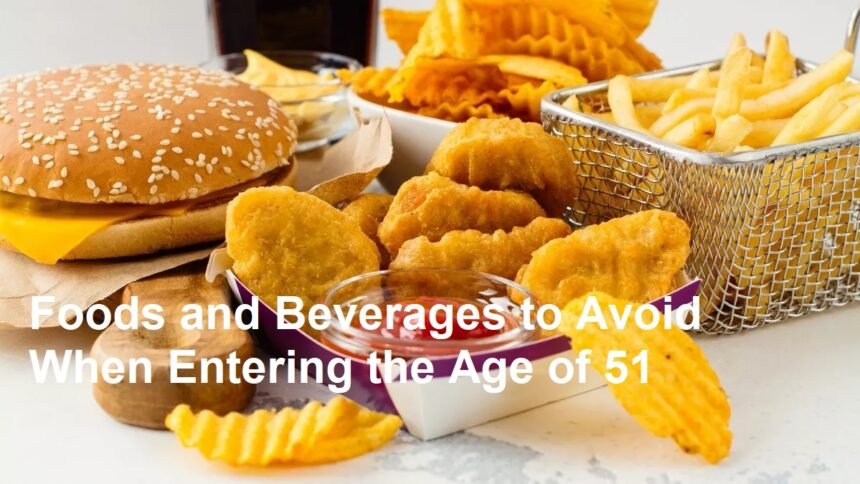Introduction
Reaching the age of 51 is a significant milestone in life. It marks a period when the body begins to undergo natural changes, and maintaining good health becomes increasingly important. Proper nutrition plays a vital role in ensuring that you stay active, healthy, and vibrant. Conversely, there are certain foods and beverages that should be limited or avoided altogether to prevent health issues common in this age group. This article explores the key foods and drinks that individuals approaching or at 51 should be cautious about, helping you make smarter dietary choices as you age.
1. Processed and Fast Foods
Processed foods, including fast food, are often high in unhealthy fats, salt, and sugar. These foods can contribute to weight gain, high blood pressure, and increased risk of cardiovascular disease. At 51, maintaining cardiovascular health is crucial, so it is advisable to minimize consumption of burgers, fried chicken, pizza, and similar fast-food options. Instead, focus on whole, nutrient-dense foods that support heart health.
2. Sugary Beverages
Beverages like sodas, sweetened coffees, and energy drinks are packed with added sugars. Excessive sugar intake is linked to insulin resistance, type 2 diabetes, and obesity — conditions that become more prevalent with age. Moreover, sugary drinks provide empty calories, offering little nutritional benefit. It’s better to replace these drinks with water, herbal teas, or infused water with fruits and herbs.
3. Refined Carbohydrates
Refined carbs such as white bread, white rice, pastries, and most baked goods made with white flour can cause rapid spikes in blood sugar levels. Over time, this can lead to insulin resistance and increase the risk of developing type 2 diabetes, especially in those over 50. Opt for whole grains like oats, brown rice, and whole wheat bread, which release energy more slowly and help stabilize blood sugar levels.
4. Foods High in Saturated and Trans Fats
Consuming too much saturated fat (found in red meat, full-fat dairy, and some oils) and trans fats (partially hydrogenated oils in baked goods and snacks) is linked to increased LDL cholesterol levels and a higher risk of cardiovascular diseases. These fats can clog arteries and strain the heart, so it’s wise to limit consumption and choose healthier fats from sources like olive oil, nuts, and avocados.
5. Excessive Alcohol
While moderate alcohol consumption might have some health benefits, excessive drinking poses significant health risks, particularly with age. Overindulgence can lead to liver problems, high blood pressure, and negatively impact bone density. In addition, alcohol can interfere with sleep quality and interact with medications often prescribed to older adults. If you choose to drink, do so in moderation — up to one drink per day for women and two for men.
6. Highly Salty Foods
A high-sodium diet is associated with increased blood pressure and risk of hypertension, which are common concerns in people over 50. Packaged snacks, canned soups, salty chips, and processed meats often contain excessive salt. Reducing sodium intake by cooking fresh and using herbs and spices for flavor can help manage blood pressure and support overall health.
7. Artificial Sweeteners and Additives
Many processed foods and drinks contain artificial sweeteners and additives that may trigger adverse health effects over time. Although they are marketed as healthier alternatives, some studies suggest they might contribute to metabolic disorders or alter gut health. It is best to read labels carefully and limit intake of foods containing synthetic ingredients.
8. Foods That Trigger Inflammation
Chronic inflammation is linked to many age-related diseases, including arthritis, heart disease, and cognitive decline. Foods that promote inflammation — such as fried foods, sugary snacks, and processed meats — should be avoided or eaten sparingly. Instead, incorporate anti-inflammatory foods like berries, leafy greens, nuts, and fatty fish into your diet.
Conclusion
As one enters the age of 51, making conscious food choices becomes imperative for maintaining health and vitality. Avoiding processed foods, sugary drinks, refined carbs, unhealthy fats, excessive alcohol, salty foods, artificial additives, and inflammatory foods can significantly reduce the risk of developing chronic diseases. Instead, focus on a balanced diet rich in fruits, vegetables, lean proteins, and healthy fats, complemented by regular exercise and sufficient rest. Small dietary adjustments today can lead to a healthier and more fulfilling life in the years ahead.












